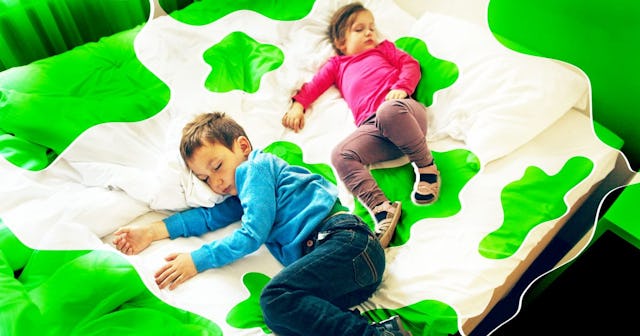You Should Stop Wearing Your Street Clothes To Bed

My kids LOVE pajama day at school. They march off to school full of smugness from having skipped a step in the morning routine. They are cozy and happy as they anticipate the feeling of staying comfortable all day in their bed clothes and couch-lounging gear.
After school, my kids roll home and the arrogance is still strong when they tell me they are already dressed for bed. Nope. No, you’re not. I will need to burn their sheets if they get into bed after wearing their pajamas out of the house all day.
“You are not wearing those pajamas to bed,” I tell them as we head upstairs for the bedtime routine.
“BUT WHY?!” They groan.
“Because they are gross,” I tell them. The conversation usually ends when I point out stains from lunch or the playground.
But what really creeps me out is the number of unseen horrors lingering on their clothes. Food, spit, snot, and whatever they are up to in the bathroom are all over their bodies and favorite outfits. Just typing the reality of my kids’ grossness makes me want to run their wardrobes through a few sanitizing cycles in the washing machine. Yes, that sounds dramatic, but I don’t care.
And it’s not just the kids’ clothes; your clothes are disgusting too, folks.
What we wear is meant to protect us. But you are not doing yourself any favors of protection if you bring the streets into your sheets.
Before you throw yourself onto the couch or flop onto your bed after a long day, think about where your clothes have been. Think about who has touched them, what surfaces they have grazed, and what bacteria has settled into the fabric. You are not doing yourself any favors of protection if you bring the streets into your sheets.
Even if we created a bubble for ourselves, we shed about 40,000 skin cells an hour. We sweat. We sneeze. We cough. And guess where all of that stays? Exactly. On our skin and trapped under our garments. Sure, they are our dead cells and dried sweat on our clothes, but do you really want them on your couch, in your bed, or on your pillow?
Your clothes also pick up everything you are exposed to all day long. The germs that make us sick—bacteria, fungi, and viruses—are passed on to us from others at work, school, the gym and the subway. These microbes can stay on clothes for a long time. Philip Tierno, MD, director of Microbiology and Immunology at New York University says, “Bacteria and organisms can survive weeks or even months on clothes.”
Before you judge me, I don’t think all germs are bad. In fact, our immune systems need germs in order to stay healthy. I don’t (nor do I want to) live in a sterile environment. But as I navigate my day outside of my messy, bathrooms-need-to-be-cleaned-yes-those-are-dust-mites house, I know I may be exposed to serious infection causing bacteria like Staphylococcus (staph) or Methicillin resistant Staphylococcus aureus (MRSA)—which is resistant to many antibiotics.
“We’ve looked at public transportation and have found MRSA, so it’s possible to get your skin affected while taking public transportation, and then potentially bringing it into the home,” says Jonathan Sexton, PhD, research specialist in the College of Public Health at the University of Arizona.
Think about where your clothes have been. Think about who has touched them, what surfaces they have grazed, and what air pollutants have settled into the fabric.
Another dangerous bacterium which can linger on your clothing is Acinetobacter. It can lead to respiratory infections and pneumonia.
While the chances of contracting these infections are small, even the possibility of getting sick with one of these illnesses keeps me out of bed with my street clothes on. I mean, if there are very simple ways for me to possibly prevent the transmission of infections and viruses in my family, then I’m going to do that.
Maybe you are eye rolling your way through my anxiety. I’m sure many of you are, but I think we can agree that if nothing else, you will carry dirt, oils, and hair from others on your clothing and into your home each day.
I may not get sick from these icky hitchhikers, but dirty sheets from dirty clothes can clog pores and cause rashes and exacerbate other skin conditions. I don’t love the idea of sleeping in filth. I wash my sheets less than I wash my clothes, so it’s ridiculous to think my bed is a clean environment. But, I can minimize the damage.
Your best bet is to have house clothes or PJs specifically meant for sleep. Personally, I shed all clothing and sleep naked, but you do you.
By the end of the day, we are all pretty filthy. Wash your damn hands, and wipe down your dirty phone. Save other, um … dirty things for your bed, and ditch the street clothes before pulling up the covers.
This article was originally published on